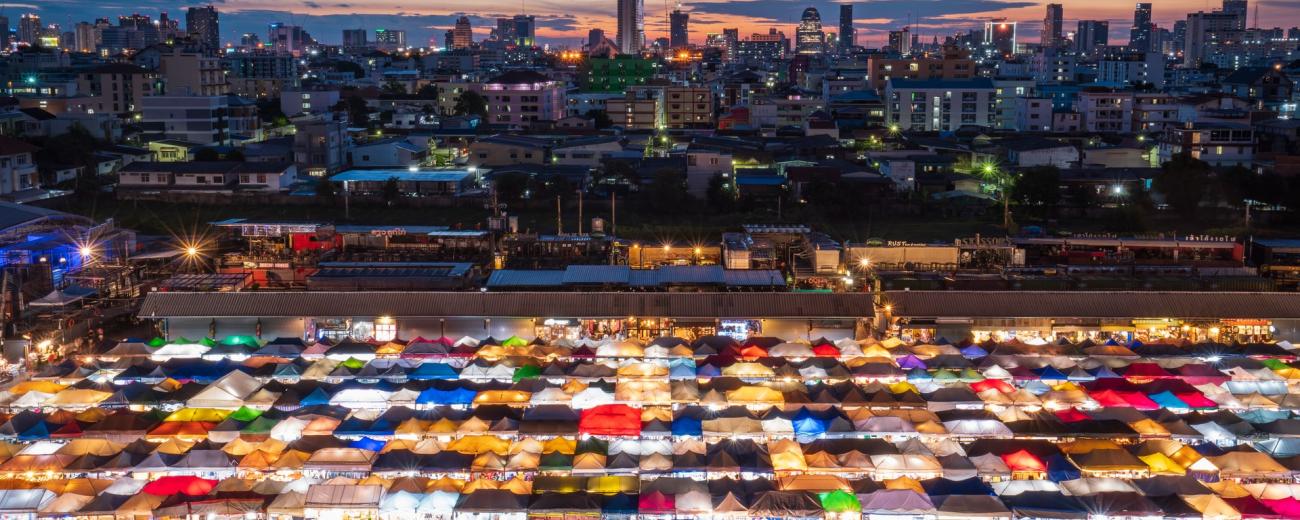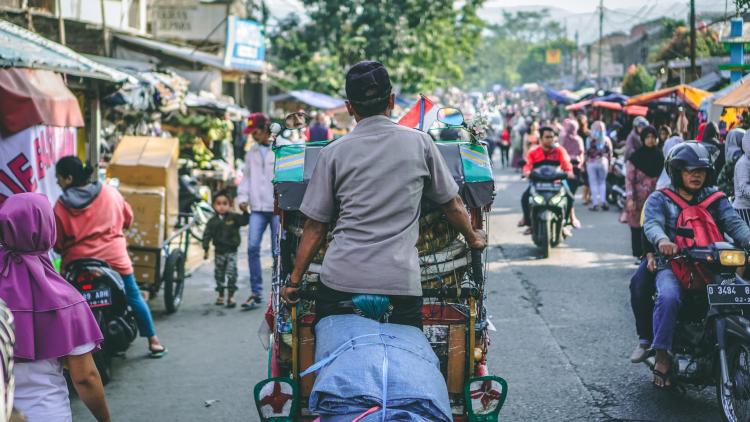
SOAS Southeast Asian Studies workshops series - Migration, Diaspora and Borderlands: Inter-Asia Dynamics

Key information
- Date
- Time
-
12:00 pm to 2:30 pm
- Venue
- Brunei Gallery
- Room
- B203
About this event
We are pleased to invite you to join the fourth SOAS Southeast Asian Studies Workshop related to 'Migration, Diaspora and Borderlands: Inter-Asia Dynamics'.
Join us for a special guest speech by Professor Anne-Meike Fechter (University of Sussex), and presentations by Yong Han Poh (Oxford PhD candidate), Xu Peng (SOAS PhD candidate) and Jaruwan Teanmahasatid (SOAS PhD candidate).
We are excited to launch a series of events that delves into the rich tapestry of literatures, cultures and politics in Southeast Asia supported by SOAS Doctoral School. This event is designed to bring together early career scholars, researchers, and enthusiasts to explore the multifaceted narratives, expressions, and identities that define this diverse and vibrant region. This series will provide a unique platform for interdisciplinary discussions and collaborations. The first and the second workshops have finished in February and March and covered topics of literature, film, folk beliefs and religions in Southeast Asia.
Speakers and audiences will engage in discussions on specific themes related to gender in Myanmar. Participants can connect and collaborate with fellow researchers and audiences. Tea, coffee, and light refreshments will be provided.
Workshops
Keynote Address
Transnationalism in Displacement: Informal Aid across the Thai-Myanmar border
The military coup of February 1st, 2021, shook Myanmar, and intensified a long-standing situation of conflict-induced displacement, with a resulting dramatic increase of people seeking shelter away from their hometowns and villages. In this context, existing networks of informal support become ever more important for people’s immediate survival, and mid-term livelihoods. In our three-year project on Protracted Displacement Economies, we investigate, across five countries, how social networks become conduits for cross-border support; how existing modes of aid are being transformed, and how new ones come into being.
These do not necessarily consist of conventional international organisations, but rather a multitude of actors which are often overlooked. They include networks sustained by kinship links, ethnic solidarities, faith-based groups, and diasporic support. Many of the people involved have past or current experience of displacement themselves. Our broader aim is therefore, to make visible patterns of mutual support and solidarity that extend among displacement-affected populations, translocally across borders, and further afield.
This helps us to better understand informal aid in displacement which come into view especially as formal actors are less prominent. We ask how pre-existing mechanisms of support function in crisis, what forms they take- and not least, how sustainable they may be in the long term.
Anne-Meike Fechter is Professor of Anthropology and International Development at the School of Global Studies, University of Sussex, UK. She currently works on informal aid and solidarities in displacement in the context of Myanmar. Her most recent book is ‘Everyday Humanitarianism in Cambodia’ (Manchester University Press, 2023).
Presentations
Play with Fire: Survival and Resilience of Ethnic Armed Organizations through Illicit Economy in China-Myanmar Borderland
This article explores the resilience and adaptability of Ethnic Armed Organizations (EAOs) within the illicit economies of the China-Myanmar borderland, focusing on
their response to changing border governance and the impacts of the COVID-19 pandemic. Traditionally engaged in activities like the opium trade and gambling,
EAOs have increasingly moved into the online scam industry due to pandemic-induced border closures. This shift demonstrates their ability to navigate and adapt to enhanced securitisation measures and reflects a broader trend towards the digitalisation of illicit economies. By analysing the transition from traditional to digital operations, this study highlights the challenges these adaptations pose to border governance and the necessity of rethinking securitisation strategies. It contributes to borderland studies by offering insights into the dynamic interplay between illicit economies and the geopolitical and economic narratives of China’s borderlands in a rapidly evolving global context.
Xu Peng is a PhD candidate in the Department of Politics and International Studies at SOAS University of London. Her research primarily explores the interactions between ethnic armed groups in borderlands and their engagement with incumbent governments and neighbouring states. While her expertise centres on the China-Myanmar borderland, she also possesses a keen interest in China’s broader foreign policy strategies concerning border regions across Asia.
Love, Labour, Loss: Exploring Migrant Worker Arts in Singapore
My presentation explores the significance of poetry, storytelling, and photography among migrant worker communities in Singapore. Drawing on previous research, I examine how these art forms have become important avenues for self-expression, community-building, and resistance for migrant workers employed in construction and domestic work on restrictive work permits and S-passes.
I show how these workers, hailing from countries such as India, Bangladesh, the Philippines, Myanmar, and Indonesia, navigate Singapore's stringent migration regime and structural constraints via the arts. I also delve into the particularities of each art form, including poetry, storytelling, and photography, and situate these creative practices within the context of Singapore's migration regime. In doing so, I highlight migrants' agency and resilience in navigating and resisting marginalized positions.
My presentation hopes to shed light on the often-overlooked cultural practices of migrant workers in Singapore, and underscore the importance of recognizing and valuing the artistic expressions of migrant communities as forms of knowledge production and political engagement.
Yong Han is a 3rd year DPhil Anthropology student at Oxford, and an instructor at NUS College. She has an MA in Southeast Asian Studies from the National University of Singapore, and a BA in Anthropology and East Asian Studies from Harvard University. She has published a review essay on 'The Chinese Question' in Southeast Asia in Critical Asian Studies, and co-edited a local/migrant poetry and short story anthology entitled Call and Response 2, published by Math Paper Press.
The Sino-Thai Commercial Community and Thai Markets in the Twentieth Century
This research proposal is focused on the Sino-Thai family businesses of Chinese community Market in Thailand, which shall be analysed as a microcosm of the socio-economic experience of the overseas Chinese in Thailand and, by extension, of the Chinese diaspora in Southeast Asia. The present project seeks to chart the integration of this local community into their host country and the contradictions which this process has produced.
As a result of the assimilation policies of successive Thai governments starting in 1918, and in particular during the overtly anti-Communist – and thus anti-China – campaigns of the 1950s, the Sino-Thai community constituted a very distinct component of the population, effectively operating within their own, largely endogamous, networks. Educational policies in Thailand played a major role in the transmission of cultural values of language acquisition and preservation amongst Children belonging to the Chinese Teochew community in Central Bangkok.
Political factors aside, economic consideration also played a role since Teochew parents regarded elite Thai or Western schools as better alternatives. The research posits that the Chinese commercial community successfully adopt to the changing political landscape in Thailand after WWII by integrating onto the domestic Thailand and international markets. In so doing, they interconnected with other markets on four different modes: 1. within the Thai Teochew community; 2. in between Teochew communities in the rest of Asia; 3. With other Chinese dialect groups (eg. Mandarin, Cantonese, or Chin Haw); 4. with external intermediaries such as Thai, Malay and middlemen.
Jaruwan Teanmahasatid is currently PhD student at History department, SOAS, University of London, UK. My interest in work-based learning in a Thai tertiary institution from Peking University with the Chinese government scholarship, led the PhD research of history of Overseas Chinese Family Businesses, mercantile and commercial community in Thailand.
After master graduation, I was honoured to be a lecturer of my alma mater, the Pridi Banomyong International College, Thammasat University, teaching an intermediate-level Chinese and Chinese business Culture and Etiquette. The knowledge transfer of Chinese-Thai family businesses at the Seminar on Political and Governance on Non-Traditional Security in Southeast Asia at National Chung Hsing University in Taiwan in 2018 was being awarded as the best research paper.
Header image credit: Kittitep Khotchalee via Unsplash


